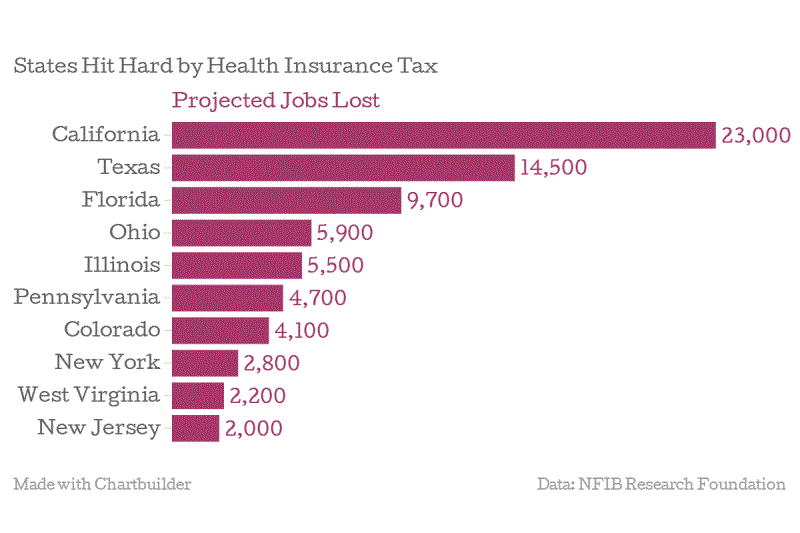Obamacare's Health Insurance Tax Could Cost Up to 286,000 Jobs
Thursday, May 8,
2014 - 4:00pm

States hit hard by Health Insurance Tax
As Ifve written previously, small businesses should brace for big health plan premium increases. Some are already seeing
this happen. Rod Winter, a Wisconsin business owner told the Wall Street Journal:
Our 440-employee business just received its initial premium from United
Healthcare for our July 1 renewal. The renewal premium represents a 29%
increase over the current premium. UHC indicated that our premiums are going
up 11% to bring our deductibles and out of pocket maximums in line with the
provisions of the ACA. In other words, without the ACA, our premiums would be
going up approximately 18%, not 29%.
New research finds that the added costs of one of Obamacarefs taxes will be
brutal on employment.
The National
Federation of Independent Businessf Research Foundation estimates that the
Health Insurance Tax (HIT)
will result in a reduction in private sector employment of
152,000 to 286,000 jobs by 2023, with 57 percent of the job losses
coming from small businesses.
This will amount to a reduction of U.S. real output (sales) by
between $20 billion to $33 billion during the same time
frame.
The chart above breaks out how individual states will be affected.
The HIT, which went into effect on January 1, 2014, levies a tax on health
plans sold on the fully-insured market. Eighty-eight percent of it is made up of
small businesses. Revenue from the tax will rise by 41% in 2015 and reach $14.3 billion in 2018.
gSmall businesses are crucial to rebuilding an economy that allows all
Americans to prosper,h Katie Mahoney, Executive Director of Health Policy at the
U.S. Chamber said. gWe need to work to find ways to ensure small businesses and
their employees have the tools to build on their current success, not hinder
future growth.h
The HIT tax simply adds to their burdens, as Fox Businessf Gabrielle Karol
reports:
gWhen employers are faced with double-digit rate increases, to add a few
additional percentage points to the renewal just makes that health insurance
less affordable and makes it less likely for them to recruit additional
employees to provide better services,h says Tom Harte, president of the
National Association of Health Underwriters.
gJust yesterday, I was sitting with a non-profit organization in New
Hampshire whose rate increase was over 18% from the prior year, and embedded
within that was the HIT. For that non-profit organization to instead be faced
with a 15% increase versus 18% would have certainly helped them to deliver
more services and provide for additional compensation for their employees,h
adds Harte.
The Stop the HIT
Coalition released a new tool that will
help small businesses and their employees calculate how much the tax will cost them. It will also help
them contact their Member of Congress to strengthen the bipartisan
support for repealing this harmful
tax.